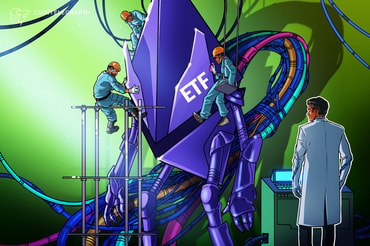Protocol Village: BlockJoy’s Introduces ‘BlockVisor 2.0,’ a Bespoke Solution for Blockchain Node Operators

Election 2024 coverage presented by
In today’s issue: Privado ID, BlockJoy, Superstate, Phylax Systems, Mawari Network, Coinbase, Base, Soulbound, Termina, Nitro Labs, Deep Blue, Arbitrum, Ika, Sui, OKX Ventures, TOP, Folius Ventures, TON, Telegram, Nebra, Truflation, ALEX, XLink, NEAR, EtherMail, Unstoppable Domains.
PROTOCOL VILLAGE EXCLUSIVE: BlockJoy, a Web3 infrastructure company, introduced BlockVisor 2.0, a “bespoke solution for blockchain node operators, eliminating the need for costly cloud infrastructure,” according to the team: “Operators can manage dedicated nodes on bare-metal servers without metered egress fees or virtualized latency. Users save up to 80% over AWS using BlockJoy’s tools to increase throughput while lowering operating costs. This version offers a fully Web3-specific toolset eliminating poorly fitting Web2 tools. BlockVisor 2.0 supports 30 protocols, including Ethereum, Polygon, and Solana.”
Privado ID (formerly Polygon ID), a privacy-focused digital identity platform, announced the launch of a “multi-chain, device-agnostic identity attestation protocol that allows people to seamlessly verify their credentials across multiple EVM-compatible blockchains,” an achievement it describes as an “industry first.” Evin McMullen, co-founder and chief strategy officer, said in a press release: “This protocol is the currently missing middleware infrastructure that mainstream Web3 ecosystems need to drive value continuously from the infrastructure toward the application layer.” According to the release: “At launch, Privado’s universal verifier is already deployed by such prominent blockchain ecosystems as Linea, Polygon PoS, Polygon zkEVM, and Ethereum, with more EVM and non-EVM networks scheduled for deployment in the coming months. Privado ID is also actively collaborating with blockchain ecosystems, protocols and enterprises and government entities to continue expanding the ecosystem of compatible platforms in the future. The new protocol introduces cross-chain compatibility, allowing users to verify their identity once and use it across any supported blockchain. These unified digital credentials, which can unlock access or capabilities for users used across multiple decentralized ecosystems and devices, offer a technically resilient form of identity compatible with legacy institutions like banks and governments.”
Glow, describing itself as a “solar acceleration protocol decentralizing the electric grid,” disclosed that it has secured a total of $30 million in investments led by Framework Ventures and Union Square Ventures (USV). According to the team: “Framework Ventures and USV co-led a $6.5 million raise and $23.5 million solar investment that will support the expansion of utility scale solar farms on Glow, commencing immediately in India.” A press release stated:
Superstate, the crypto fund project led by Compound founder Robert Leshner, has introduced the “first-ever continuous pricing feature for its USTB fund, offering 24/7 Net Asset Value per share (NAV/S) updates, even during non-market hours,” according to the team: “This upgrade allows investors to earn instant interest, eliminating delays seen in traditional fund management. As the first of its kind for any tokenized fund, it sets the foundation for future innovations, including atomic minting and redemptions (coming soon for USTB), enabling near-instant settlements, further enhancing liquidity management and investment precision.”
Phylax Systems, a pioneering blockchain security startup born from the aftermath of one of DeFi’s largest hacks, has successfully closed a $4.5 million pre-seed funding round to revolutionize blockchain security through its innovative Credible Layer protocol. The pre-seed round was led by Nascent Capital and Figment Capital, with additional support from Robot, Hash3, Bankless, BreedVC, and Public Works. A roster of prominent angel investors also participated, including Nic Carter, Nader Dabit and Eric Wall.
Mawari Network, describing itself as a DePIN for spatial computing, announced a limited node license sale for its spatial computing DePIN. According to the team: “The node sale will make Mawari’s 3D streaming technology more scalable and accessible for content creators and developers. Mawari’s infrastructure is optimized for the demanding needs of immersive experiences, comprising the Spatial Streaming SDK and the Mawari Network. The SDK, supporting Unity and Unreal engines, empowers developers to create seamless, immersive experiences. The Mawari Network, working in parallel, leverages a decentralized network of GPU nodes to ensure low latency and optimal performance.
Axal, a network for verifiable automous agents, is emerging from stealth with $2.5M in pre-seed funding to launch Axal Autopilot, an advanced agent-powered trading automation platform. According to the team: “Unlike typical trading bots, which handle basic functions like copy trading, Axal Autopilot enables personalized, multi-step strategies through autonomous agents. Integrated with Movement Labs’ ecosystem (with $160M+ in TVL), it offers features such as risk-based portfolio allocation, automated yield harvesting (Aave v3, Uniswap), smart rebalancing, exit strategies and programmable yield distribution.”
The U.S. crypto exchange Coinbase’s layer-2 chain, Base, has enabled fault proofs on the main network, “marking a key milestone on our path to decentralization.” The announcement comes four months after Optimism — the layer-2 blockchain upon which Base’s technology is built — added fault proofs, a core feature at the heart of so-called optimistic rollups. According to a blog post from Base: “Fault proofs are an essential component of going from Stage 0, in which a rollup has ‘full training wheels,’ to Stage 1, which has ‘limited training wheels.’ This year, the Base core team collaborated closely with Optimism to bring the OP Stack Fault Proof System to Base. This enables a decentralized approach to proposing and validating L2 state, and paves the way towards more community participation.” The post continued:
Soulbound, a decentralized streaming platform, has relaunched with a new design and interactive features, including real-time betting on live content. According to the team: “With the relaunch, Soulbound is integrating StreamFi and GambleFi, which will redefine how content is monetized on live-streaming platforms. Streamers can start earning from day one, as the platform pays in its native token, Soulbucks (SBX), based on views, interactions and other engagement metrics. Viewers will be able to place bets on Soulbound on in-stream events — like predicting a player’s next move or the outcome of live matches.”
Redacted, a leader in Web3 data and entertainment, has launched The Redacted Fund to support early-stage investments in seven innovative projects. Announced at “Redacted Airways,” the first airborne Web3 event, the fund aims to strengthen decentralized applications in entertainment, DeFi, and infrastructure. According to the team: “Founders can expect not just capital in tokenomics. By allocating part of our upcoming RDAC Token to portfolio companies, we provide incentives for growth.”
Legion, a merit-based on-chain fundraising platform aimed at reshaping early-stage crypto investment, announced Arbitrum, the leading Ethereum Layer 2 network, as its preferred EVM network for all on-chain activity. According to the team: “The platform leverages blockchain technology to provide a transparent and efficient way for projects to raise capital while ensuring investors can assess and support based on merit. By bringing its business to Arbitrum, its robust community will be able to invest in early-stage companies in a previously unprecedented manner.”
Termina, the SVM-as-a-Service platform by Nitro Labs, has raised a $4 million seed funding round, led by Lemniscap. [NOTE: SVM stands for Solana Virtual Machine — the operating environment for smart contracts on the Solana blockchain.) According to the team: “Recognizing the lack of SVM infrastructure offerings across the market, Nitro Labs got to work on building Termina, with a clear mandate to scale the SVM while empowering developers to create customizable Solana-based networks optimized for performance and privacy. Currently over 20 ecosystem partners are building alongside Termina, including both Solana-native and cross-chain projects, allowing developers to deploy and manage purpose-built SVM networks quickly and efficiently.”
Deep Blue, a newly launched stablecoin issuance platform aiming at developing the industry across real world and crypto applications, announce its integration with Arbitrum, the largest EVM layer-2 scaling solution by market value. According to the team: “This combines Deep Blue’s best-in-class stablecoin issuance with Arbitrum’s powerful and innovative layer 2.”
Ika, claiming to be the fastest parallel MPC network, launched on Sui, “offering secure, interoperable solutions across multiple chains like Bitcoin, Ethereum and Solana without traditional bridging. Ika empowers Move smart contract developers and enables institutional-grade scalability and security by leveraging Sui’s Mysticeti consensus and novel 2PC-MPC cryptography. This ultra-fast MPC network powers applications such as Programmable Bitcoin, DeFi interoperability, decentralized custody, chain abstraction and secure AI guardrails.”
OKX Ventures, The Open Platform (TOP) and Folius Ventures have launched a $10 million Telegram Growth Hub to accelerate innovation on the TON blockchain and enhance Telegram’s mini-app ecosystem. According to the team: “The initiative will fund up to 10 projects focused on key areas such as user onboarding, on-chain trading features and mini-apps for gaming and entertainment that expand TON’s use cases. Selected projects will receive funding, developer resources (including OKX Connect) and mentorship. Applications are open until Nov. 29 at https://tally.so/r/mJk9R7.”
Nebra, a leading provider of zero-knowledge solutions, announced that its Universal Proof Aggregation (UPA) is live on the World Chain mainnet, delivering a first-of-its-kind scalable zk-proof solution to the network. According to the team: “Supported by the Community Grants Program Wave0 to help advance the World Network Tech Tree, NEBRA UPA introduces breakthrough efficiency in zk-proof verification tech, capable of cutting costs by over 90%. This makes privacy tech accessible, efficient, and censorship-resistant across World Chain, paving the way for more widespread, real-world adoption.”
Truflation, in partnership with Digital Asset Solutions, has launched its first-ever Meme Coin Index, offering investors a unique way to track and invest in the memecoin sector, according to the team: “This index aggregates eight leading meme coins across multiple chains, including Shiba Inu, Pepe, Dogecoin and Floki, enabling diversified exposure to a $40 billion market. Traders can now access the booming meme coin economy through a single investment, simplifying portfolio management and providing a benchmark for sector performance.”
ALEX and XLink are joining forces with NEAR Protocol (NEAR) to develop Bitcoin Oracle V2. According to the team: “DeFi on Bitcoin finality is here and the Bitcoin Oracle V2 will allow a user friendly Native Bitcoin defi experience, cross chain functionality and solve liquidity fragmentation issues observed on Ethereum. The integration of Bitcoin Oracle V2 with XLink will enable ALEX to iterate and deliver an unparalleled permissionless and decentralized trading platform.”
EtherMail and Unstoppable Domains have launched “.ethermail” domains, unlocking single sign-on (SSO) capabilities for EtherMail’s 2.3 million users. The new .ethermail domains – enabling EtherMail users to replace long, complicated wallet addresses with a single, easy-to-read name – will be minted on Base, providing users with a cost-effective way to secure their digital identity. Users can log in to Unstoppable Domains using their EtherMail credentials. The new .ethermail domains will be automatically supported within Unstoppable Domains’ ecosystem of hundreds of dApps, wallets and exchanges.
Protocol Village is a regular feature of The Protocol, our weekly newsletter exploring the tech behind crypto, one block at a time. Sign up here to get it in your inbox every Wednesday. Project teams can submit updates here. For previous versions of Protocol Village, please go here.
Edited by Bradley Keoun.
Disclosure
Please note that our privacy policy, terms of use, cookies, and do not sell my personal information have been updated.CoinDesk is an award-winning media outlet that covers the cryptocurrency industry. Its journalists abide by a strict set of editorial policies. CoinDesk has adopted a set of principles aimed at ensuring the integrity, editorial independence and freedom from bias of its publications. CoinDesk is part of the Bullish group, which owns and invests in digital asset businesses and digital assets. CoinDesk employees, including journalists, may receive Bullish group equity-based compensation. Bullish was incubated by technology investor Block.one.
Bradley Keoun is the managing editor of CoinDesk’s Tech & Protocols team. He owns less than $1,000 each of several cryptocurrencies.

Published on Other News Site












